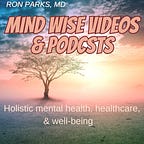Hi! Welcome to a Mind Wise audio video podcast, presenting perspective and information about holistic mental health, health care, wellness, neuroscience, philosophy, and spirituality. I am your host, Ron Parks, MPH, MD, writer, teacher, and consultant.
Our focus and topic today is how Sleep is the best guide and feedback for your health, longevity, and productivity.
Monitoring sleep quality can be an invaluable tool in choosing your priorities and be an early warning sign of impending difficulties.
Attention to sleep cues is essential for preserving or restoring health and vitality. Disruptive and perturbed sleep or anxiety dreams and nightmares can portend problems ahead. Dilemmas, indecisions, and conflicts are impediments to productivity and well-being. Disruptive sleep is an indicator of distress levels and a warning that critical life areas need attention. Ignoring unhealthy sleep patterns can have dire consequences now or in the future. How sleep and dreams informed and warned me about an unfolding precarious situation.
During the middle part of my medical career, my interests in integrative and holistic medicine led me to study and work with one of the leaders in the field of nutritional medicine who advocated for a broader and open-minded approach to personal health and its care. When I struggled to master the business aspect of doing my holistic medical and mental health practice in Baltimore, one of the university-affiliated, prestigious Indiana medical centers was trying to set up its own integrative and holistic medicine departments. It hoped to offer innovative and complementary approaches for its patients and to be one of the first in the country to do so. As they were trying to build and hire staff, I was identified by one of their recruiters as someone experienced in the popular rising new model of integrative and holistic healthcare. On the recruiter's first call, I told him I was very reluctant to make a significant change or move, especially as I was in the early stages of setting up my own program. He understood and said he would check in later in the year as they set up their extensive program.
When he called several months later, I struggled with my inexperience in business and an exceedingly high overhead. I mistakenly asked the recruiter how much salary they would offer. It reminds me of the story about the devil and his training disciple following a depressed and dejected-looking monk down a path leading to a river. The devil and disciple observed the monk bending down and picking up an enormous globe of light, which penetrated him until he glowed and everything around him. The devil disciple, looking defeated, turned to his master and said, "Boss, I guess we lost this one as he has become enlightened." The devil put his arm around his disciple with a big smile and said, "It is just the beginning; we will continue to follow him until the time is right, and then we will get him." A skilled sales attendant told me this story when I confronted him about his sneaky and deceptive sales tactics.
The recruiter made an impressive offer of salary, benefits, and all paid moving expenses, plus a free trip out to see the program and be interviewed. So, what is someone of my naivete at the time to say but "yes." I figured at least it would give my wife and me a free vacation away to an exciting place unexplored by us, a vibrant city in a different country. My wife and I made haste to make the arrangements for the trip, which we felt might be a promising future for us and maybe a gift for our needs at the time. It was stressful not only in making the preparations but also in constant worry about whether this was the right thing to do or if we had taken the proper time to consider all the options and concerns. I was also worried that I wouldn't be adequately prepared if I were drilled with questions, possibly exposing some of my inadequacy or lack of expertise they may value. A sign of this was I was packing some of my technical journal and current reading matter in my field of specialty. My mother warned me, "I shouldn't bite off more than I could chew" or "not to let my eyes be bigger than my stomach." Both my wife and I had disturbed, restless sleeping and anxious dreams, which I don't remember now but probably portending a precarious future or risk to my health or career. We finally made our plane and flight to the Midwestern city. My wife scared us as the plane was coming in for a landing. Her heart briefly went into an irregular heart rhythm, which she had had once before and was diagnosed as a condition to watch but of no immediate concern. It returned to normal before we landed, which should have also been not so subtle a message that our possible new adventure might not be the best choice for us.
We got to the interview in one piece, and the people were amiable, at least on the surface. They carefully checked my credentials, and I was more than adequate in answering questions that came my way. It felt a little uncomfortable as they were interested in my religion. The hospital system was directed and administered by another faith tradition than mine, which seemed an inappropriate inquiry at the time. They seemed particularly interested in how many patients I could see to maintain their profits and bottom line more than my leadership potential, skills, knowledge, and teaching abilities with the new model they wanted to develop and capitalize on. Their inquiry also surprised me, as they were supposed to be a nonprofit institution.
Once we had settled into a new home, I began my work in my new position. During my first year, I felt I was adding value to their program by teaching and adding new programs. Still, many disappointments and occurrences fell far short of my expectations, especially their failing financial situation and beginning to lay off professional staff. Finally, my position was threatened. All this was very stressful, but luckily, because of my knowledge and interest in holistic health practices and awareness, I was on top of what was happening in terms of my discomfort at what was happening.
Some of my preparation and strategic action came as I saw all my mental and bodily warning systems signaling that attention and intervention were needed. One of the critical areas I followed and was a concern was my disturbed sleep pattern, which seemed to affect my daytime alertness and performance as anxiety and worry increased. As things were worsening in terms of the deterioration of the hospital-contracted job situation, I was alarmed enough to find and get advisement from experienced people, including one of the best employment attorneys in the area, who turns out to have a history of dealing with similar situations with this same hospital that was attempting to undermine my position and contract. The hospital center had a history of taking these deceitful and adverse actions against employees when they were in trouble with their programs.
Fortunately, all turned out well, with me making strategic interventions when needed. I was able to leave that hospital, transition to a new city, a better position, and gain more in-depth training and experience in holistic and integrative healthcare for my career and personal growth. My somewhat negative experience in the hospital contract job was a valuable learning experience, as it deepened my insight into the workings of the corporate world and left me better informed about some of my future choices and consultation work.
Key points and tips about sleep
1. Pay attention to changes in sleep and appreciate the value as a gauge for possible harmful stress levels and overworking of mental activity. Sleep disturbance can be a warning sensor for the need to pay attention, be alert for danger, or for things that may be detrimental to your best interests; investigate and make necessary changes and take any action required to avoid the consequences of not heeding our natural body's feedback system.
2. As noted below, significant and persistent signs of disturbed sleep may show a need for taking action or getting help:
nightmares that wake you up,
frequent awakening,
clock watching,
daytime sleepiness or napping too much during the day,
grogginess,
difficulty concentrating,
difficulties with memory and mental functioning (cognitive performance),
brain fog, forgetfulness, loud snoring that wakes you and others,
difficulty falling asleep or staying asleep,
incessant overactive mental activity as trying to figure something out or solve some dilemma rather than sleeping,
negative thoughts and emotions, such as fear or anger, that keep you awake,
significant mood changes, anxiety, and irritability.
3. Know about the medical, emotional, and mental health consequences of the loss of restorative sleep or a buildup of sleep debt—when you get further behind in the amount of sleep needed to maintain health, vitality, and functioning of vital organs, including your brain and nervous system.
4. Be aware of sleep disorders so you will know about them and when to seek help or consultation for such conditions as insomnia, sleep apnea, narcolepsy, restless leg syndrome, parasomnias, excess daytime sleepiness, shift work disorders, sleep paralysis, and more; see details and descriptions at https://www.sleepfoundation.org/sleep-disorders.
5. Getting inadequate sleep can weaken your body's immune defenses and put you at higher risks for such illnesses as obesity, diabetes, heart disease, hypertension, dementia, mental performance difficulties, and cognitive impairment as with memory and learning, auto accidents, mood disorders, and other psychological and physical health conditions.
6. Recommendations for improving sleep include:
1. Consider a better mattress, pillows, and bedding,
2. Block out unnecessary light with optimal bedroom window coverings or eye shades—light from any source may interfere with your sleep cycle and biological rhythm,
3. Minimize noise or drown it out with a noise machine, fan, earplugs, or headphones,
4. Sleep in a cool room, optimally between 65- and 68 degrees Fahrenheit,
5. Ideally, get at least 7 hours of sleep each night,
6. Have a fixed time of getting up each morning and soon after waking, when possible, expose yourself to 30 minutes of natural light exposure or consider a therapeutic light box,
7. Napping is fine; optimally about 20 minutes after lunch or early afternoon when feeling tired, groggy, or drained. Napping can refresh your mind with clearer thinking, quicker responses, better memory, and mood. Some may need a longer nap if sleep deprived or like an athlete that expends more energy or as someone in pregnancy.
https://www.nytimes.com/2023/11/23/well/live/afternoon-nap-tips.html?smid=nytcore-android-share
8. Avoid caffeine after 2 pm, no alcohol in the evening before bedtime, and avoid the use of nicotine and smoking, which is a stimulant,
9. Avoid electronic devices the hour before bedtime and allow time to wind down as light and stimulation from these sources can suppress the regulators and body rhythms for going to sleep,
10. Have a relaxing routine in a low light area 30 minutes before going to bed—I do yoga with stretching and breathing techniques with meditation, and sometimes take a warm bath with a cup to two of Epsom Salt (mag sulfate), or occasionally take a low dose of oral melatonin (1-3 mg), and a magnesium supplement,
11. Try to get 30 minutes or more of active exercise during the day,
12. Eat early in the day and avoid food a few hours before bedtime, as undigested food can interfere with sleep,
13. Limit bed use for sleep and intimacy,
14. Get out of bed after 20 minutes or so if not sleeping, readjust briefly, and then return to bed,
15. For persistent sleep disturbances, consult a sleep expert or therapist and consider some proven effective cognitive behavior sleep therapy programs, such as C.B.T.-I., available online. https://www.sleepfoundation.org/sleep-hygiene/healthy-sleep-tips and https://www.behavioralsleep.org/index.php/united-states-sbsm-members,
16. To sleep better with the benefits may mean choosing a more optimal and consistent lifestyle, especially when it comes to diet, improving nutrition, exercise, social connectedness, and spiritual awareness.
Your ideas and comments are welcome; two or many heads are often better than one.
For help in gaining clarity and perspective, go to parksmd.com/scheduling/
I appreciate your interest. Please share with others. Subscribe to my Substack newsletter and podcast at www.inmindwise.com. All content is created and published for educational purposes only and should not be construed as a substitute for professional or medical services or guidance. Always seek your healthcare provider's care regarding medical or mental health conditions. This communication is not intended to provide a medical diagnosis, recommendation, treatment, or endorsement. Thank you.










